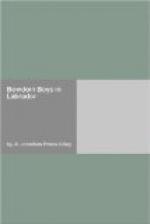Hopedale,
Labrador,
October
3, 1893.
Dear Madam:
For your very kind letter and for the very useful articles for our people, accept my best and kindest thanks. We have already made some of the people glad with cloth, and we will but be so glad for them in the winter time.
Happily the codfishery has been much better this year than last, thus we can more confidently look forward to the coming winter time than we could last year; because our people were so poor and we finished the many kind gifts long before the spring came on, when they were able to earn their own bread.
We have had a very cold and dreary summer, the few warm days could easily be counted, and now the winter is at the door.
On last Christmas day we had a nice Christmas celebration with our school children in the chapel. For this purpose we had placed two nice Christmas trees and two illuminated transparents in the chapel. My dear husband translated some lovely Christmas songs into Eskimo, and I taught the children to sing them. Between the hymns they recited songs and texts from the Bible. Sometimes one by one and then again altogether. The children made it very nicely. The choir, which sang some nice pieces, helped to make the whole to sound better. Finally every child got a large biscuit and a cup of tea, which seemed to make greater impression than the whole celebration. The congregation were also invited and they were very much interested in it.
In the midst of February I accompanied my dear husband on his journey around to the settlers belonging to our congregation, which live scattered far away from here towards the South.
We left Hopedale one morning, having 30 degrees Cen. of cold, of course by “kamatik” (dog sledge). I was well wrapped up so that I did not freeze so very much, but the worst is always on such a trip that we cannot eat anything. Before we started I made some meat balls for the purpose to use them during the nine hours driving, but it was impossible to make use of them because they were like stones without fearing to loosen our teeth. Happily I had some biscuits and to become more strengthened I used a little chocolate. We were nearly three weeks away from home and in that time we were nearly every day on the kamatik. Never less than five hours at a time, but generally from seven to nine hours, and twice from eleven to twelve hours. It was indeed sometimes very exhausting especially one time when we came to very poor people where we had for two days nothing to eat and the next day we had to travel for about eleven hours having nothing but dry biscuits. I did not feel so very well that time.




